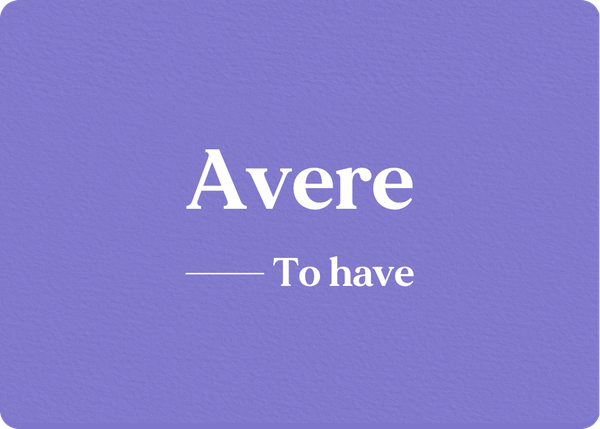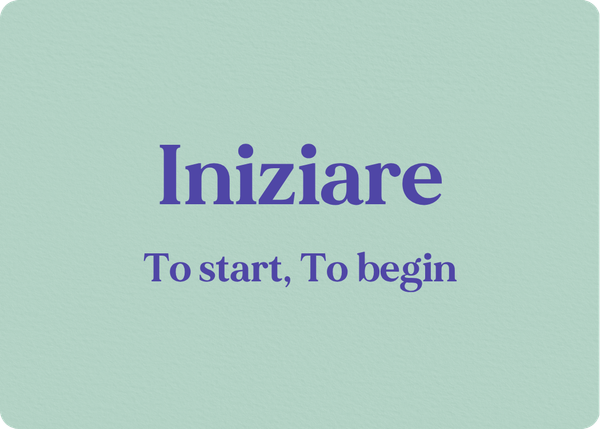What is Avere?
Avere is one of the most fundamental Italian verbs meaning "to have". While it appears to belong to the second conjugation (-ERE verbs), it actually has its own unique conjugation pattern. This essential verb is absolutely crucial for expressing possession, forming compound tenses as an auxiliary verb, and is one of the first verbs every Italian learner must master alongside "essere".
Key Features of Avere
- Type: Has its own unique conjugation (highly irregular, not following standard -ERE patterns)
- Meaning: To have
- Irregularities: Present tense (ho, etc.), future (avrò), simple past (ebbi, etc.), present subjunctive (abbia), conditional (avrei), imperative (abbi)
- Auxiliary verb: "Avere" uses itself as its own auxiliary in compound tenses (Ho avuto - I have had)
Indicativo – Indicative Mood
Presente (Present Tense)
| Person | Conjugation |
|---|---|
| io | ho |
| tu | hai |
| lui/lei | ha |
| noi | abbiamo |
| voi | avete |
| loro | hanno |
Example:
Ho due gatti e un cane.
I have two cats and a dog.
Passato Prossimo (Present Perfect)
| Person | Conjugation |
|---|---|
| io | ho avuto |
| tu | hai avuto |
| lui/lei | ha avuto |
| noi | abbiamo avuto |
| voi | avete avuto |
| loro | hanno avuto |
Example:
Stamattina abbiamo avuto un problema tecnico con il computer.
This morning we had a technical problem with the computer.
Imperfetto (Imperfect)
| Person | Conjugation |
|---|---|
| io | avevo |
| tu | avevi |
| lui/lei | aveva |
| noi | avevamo |
| voi | avevate |
| loro | avevano |
Example:
Da bambina avevo paura del buio.
As a child, I was afraid of the dark.
Trapassato Prossimo (Past Perfect)
| Person | Conjugation |
|---|---|
| io | avevo avuto |
| tu | avevi avuto |
| lui/lei | aveva avuto |
| noi | avevamo avuto |
| voi | avevate avuto |
| loro | avevano avuto |
Example:
Prima di lasciarsi, avevano avuto una lunga discussione.
Before breaking up, they had had a long discussion.
Passato Remoto (Simple Past)
| Person | Conjugation |
|---|---|
| io | ebbi |
| tu | avesti |
| lui/lei | ebbe |
| noi | avemmo |
| voi | aveste |
| loro | ebbero |
Example:
Caravaggio ebbe una vita turbolenta.
Caravaggio had a turbulent life.
Trapassato Remoto (Past Anterior)
| Person | Conjugation |
|---|---|
| io | ebbi avuto |
| tu | avesti avuto |
| lui/lei | ebbe avuto |
| noi | avemmo avuto |
| voi | aveste avuto |
| loro | ebbero avuto |
Example:
Appena ebbero avuto il permesso, iniziarono i lavori.
As soon as they had had the permission, the work began.
Futuro Semplice (Simple Future)
| Person | Conjugation |
|---|---|
| io | avrò |
| tu | avrai |
| lui/lei | avrà |
| noi | avremo |
| voi | avrete |
| loro | avranno |
Example:
Domani avrò più tempo per parlare con te.
Tomorrow I will have more time to talk with you.
Futuro Anteriore (Future Perfect)
| Person | Conjugation |
|---|---|
| io | avrò avuto |
| tu | avrai avuto |
| lui/lei | avrà avuto |
| noi | avremo avuto |
| voi | avrete avuto |
| loro | avranno avuto |
Example:
Quando tornerai, avrò avuto modo di leggere tutti i documenti.
When you return, I will have had time to read all the documents.
Congiuntivo – Subjunctive Mood
Presente (Present Subjunctive)
| Person | Conjugation |
|---|---|
| che io | abbia |
| che tu | abbia |
| che lui/lei | abbia |
| che noi | abbiamo |
| che voi | abbiate |
| che loro | abbiano |
Example:
Spero che tu abbia abbastanza tempo per finire il lavoro.
I hope you have enough time to finish the work.
Passato (Past Subjunctive)
| Person | Conjugation |
|---|---|
| che io | abbia avuto |
| che tu | abbia avuto |
| che lui/lei | abbia avuto |
| che noi | abbiamo avuto |
| che voi | abbiate avuto |
| che loro | abbiano avuto |
Example:
Licia e Benedetta sono arrivate in ritardo, credo che abbiano avuto problemi con il treno.
Licia and Benedetta arrived late, I think they had problems with the train.
Imperfetto (Imperfect Subjunctive)
| Person | Conjugation |
|---|---|
| che io | avessi |
| che tu | avessi |
| che lui/lei | avesse |
| che noi | avessimo |
| che voi | aveste |
| che loro | avessero |
Example:
Credevo che tu avessi più esperienza.
I thought you had more experience.
Trapassato (Past Perfect Subjunctive)
| Person | Conjugation |
|---|---|
| che io | avessi avuto |
| che tu | avessi avuto |
| che lui/lei | avesse avuto |
| che noi | avessimo avuto |
| che voi | aveste avuto |
| che loro | avessero avuto |
Example:
Avrei preferito che tu avessi avuto più fiducia in me.
I would have preferred that you had had more confidence in me.
Condizionale – Conditional Mood
Presente (Present Conditional)
| Person | Conjugation |
|---|---|
| io | avrei |
| tu | avresti |
| lui/lei | avrebbe |
| noi | avremmo |
| voi | avreste |
| loro | avrebbero |
Example:
Emilio avrebbe bisogno di aiuto con i compiti.
Emilio would need help with his homework.
Passato (Past Conditional)
| Person | Conjugation |
|---|---|
| io | avrei avuto |
| tu | avresti avuto |
| lui/lei | avrebbe avuto |
| noi | avremmo avuto |
| voi | avreste avuto |
| loro | avrebbero avuto |
Example:
Avremmo avuto meno problemi se ci fossimo organizzati meglio.
We would have had fewer problems if we had organized ourselves better.
Imperativo (Imperative)
| Person | Conjugation |
|---|---|
| (tu) | abbi |
| (lui/lei) | abbia |
| (noi) | abbiamo |
| (voi) | abbiate |
| (loro) | abbiano |
Example:
Abbi pazienza con tuo fratello!
Be patient with your brother!
Indefinite Moods
Infinito (Infinitive)
- Presente (Present): avere (to have)
- Passato (Past): avere avuto (to have had)
Examples:
È importante avere fiducia in se stessi.
It's important to have confidence in oneself.
Credo di aver(e) avuto degli ottimi insegnanti.
I think I’ve had some really great teachers.
Participio (Participle)
- Presente (Present): avente (having) - mainly used in bureaucratic language and fixed forms
- Passato (Past): avuto (had)
Examples:
Il cliente avente diritto al rimborso deve presentarsi in ufficio.
The customer entitled to the refund must come to the office.
Ho avuto una giornata difficile.
I had a difficult day.
Gerundio (Gerund)
- Presente (Present): avendo (having)
- Passato (Past): avendo avuto (having had)
Examples:
Avendo poco tempo, ho preso un taxi.
Having little time, I took a taxi.
Avendo avuto problemi simili, posso capirti.
Having had similar problems, I can understand you.
The verb Avere at a glance: Key tenses you need
| Present | Present Perfect | Imperfect | Present Subjunctive | Imperfect Subjunctive | Present Conditional |
|---|---|---|---|---|---|
| io ho | io ho avuto | io avevo | che io abbia | che io avessi | io avrei |
| tu hai | tu hai avuto | tu avevi | che tu abbia | che tu avessi | tu avresti |
| lui/lei ha | lui/lei ha avuto | lui/lei aveva | che lui/lei abbia | che lui/lei avesse | lui/lei avrebbe |
| noi abbiamo | noi abbiamo avuto | noi avevamo | che noi abbiamo | che noi avessimo | noi avremmo |
| voi avete | voi avete avuto | voi avevate | che voi abbiate | che voi aveste | voi avreste |
| loro hanno | loro hanno avuto | loro avevano | che loro abbiano | che loro avessero | loro avrebbero |
Conclusion
Mastering the conjugation of "avere" is absolutely essential for Italian communication. This highly irregular verb requires memorization of its unique forms, especially in the present tense (ho, etc.) and its role as an auxiliary verb in compound tenses.
Remember the key points:
- Completely irregular present tense forms
- Essential auxiliary verb for most compound tenses
- Future/conditional stem changes to "avr-"
- Used to express possession, age, and in many idiomatic expressions
- Foundation for understanding Italian grammar structure
Keep practicing with real sentences and soon you'll master this fundamental Italian verb!





